Integrated model serving vulnerable populations now followed in at least four states
 Listen to this story.
Listen to this story.
NYC_OHC_medical
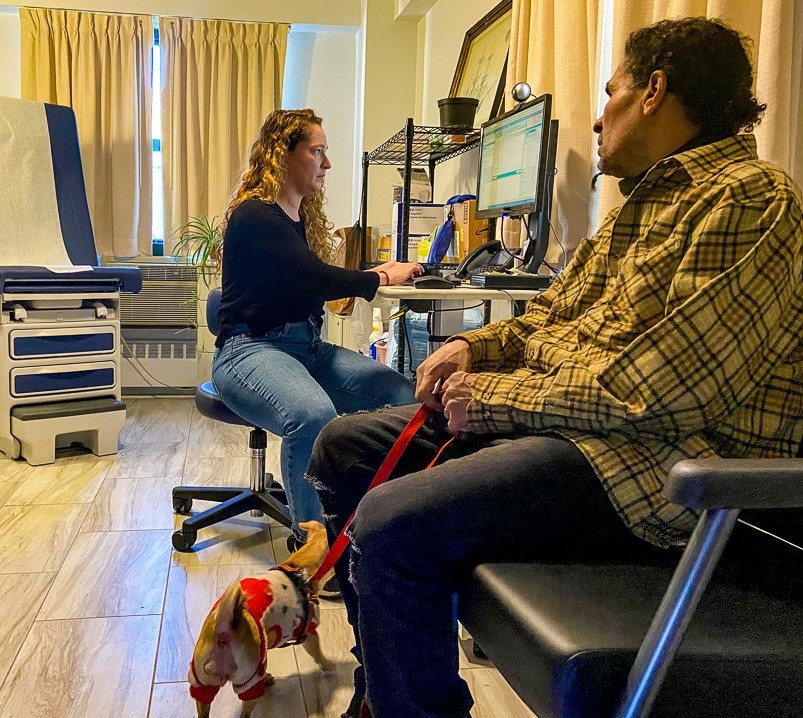
Breaking Ground photo
Early this year, Israel (right) took his dog Bella to a One Health clinic in Manhattan for pet owners who are unhoused or facing housing insecurity. After Bella's exam, Israel took her upstairs with him for his appointment with Emily Gerteis, a registered nurse practitioner for Janian Medical Care, a nonprofit health care organization.
In a conference room at a Manhattan housing facility for people transitioning from homelessness, a man brought in his black and white cat for a free exam. He was worried about a cough the pet had developed. The veterinarian, upon learning that the man smoked, explained that secondhand smoke can inflame a cat's airways, causing asthma and bronchitis.
Less than a half-hour later, the man was talking with a physician a few floors up about kicking his habit to help his cat get better.
The scene, described by social worker Alejandra Magaña, encapsulates an unorthodox integrated care model that is popping up in a few cities and towns around the country. As a care provider on site at the time, Magaña said it was one of those moments that "the One Health model really comes to life."
One Health is the concept that the health of humans, other animals and the planet are intertwined. One Health clinics build on these interconnections by bringing human health care practitioners together with veterinary professionals to help vulnerable populations.
Proponents of the One Health approach say it can be particularly effective with unhoused pet owners, many of whom report they are more likely to seek care for their animals than for themselves. The model also eliminates a barrier to care, since nearly all animals are prohibited in medical settings.
The New York City clinic has convened four times since launching in January 2023. It was inspired by a One Health clinic in downtown Seattle, which describes itself as the first of its kind in the country. A collaboration of the University of Washington's Center for One Health Research and Washington State University College of Veterinary Medicine, the clinic began providing integrated care in 2018 at a drop-in center and shelter for youths and young adults.
The UW and WSU team has worked to seed clinics elsewhere by promoting the idea at conferences and providing a toolkit supplemented with in-person help to organizations that want to start their own operations.
It's working. In addition to the New York clinic, one began in Tucson, Arizona, in October. The Washington state group also began piloting a second One Health clinic at an all-ages supportive housing site in northwest Seattle last fall.
In a parallel development, a veterinary nonprofit in Colorado in 2021 launched community health fairs for people and their animals in Denver and in underserved areas around the state.
The initiatives all rest on the tenet that veterinary care can be a gateway and an assist to human health care. But each is different in how it adapts to fit the resources, personnel and needs of a given place and time.
A ‘creative solution' in New York
Magaña is a program director for Breaking Ground, the nonprofit housing development and social services organization in New York that launched the One Health clinic. She and Breaking Ground colleague John Betts learned about the Seattle example during a 2022 presentation by several members of the team including Vickie Ramirez, a senior research coordinator in One Health at UW.
"Alex and I are both animal lovers," said Betts, the organizations' assistant vice president of program development and innovation. "And I cornered Vickie afterward."
Breaking Ground was particularly suited to the model because it already collaborates with Janian Medical Care, a New York-based nonprofit providing primary care, psychiatry and nursing to people who are or were homeless. Janian provides mobile care to Breaking Ground outreach teams and has medical suites in many of its housing facilities.
Dr. Jill Maddox, a physician who works for Janian as the medical director for the Breaking Ground collaboration, loved the idea as soon as she heard about it.
"We're all about overcoming barriers to engaging people in care," she said. "And it's still very hard to engage this population in care, so any creative solution is something I want to try."
UW's Ramirez introduced the New York team to Dr. Biana Tamimi, who volunteers with the Street Dog Coalition, a national nonprofit providing free veterinary care to people experiencing homelessness or at risk of homelessness. A third-year shelter medicine resident at the American Society for the Protection of Animals in New York, Tamimi agreed to be lead veterinarian for the Breaking Ground efforts. Veterinary and pet supplies are primarily provided by the Street Dog Coalition as well as another local veterinary care nonprofit, Positive Tails.
Tamimi said One Health wasn't a concept she learned about in her classes at the Royal (Dick) School of Veterinary Studies in Edinburgh, from which she graduated in 2017. However, a professor there had invited her and other students to assist at a clinic he ran for pet owners experiencing homelessness.
Tamimi_1
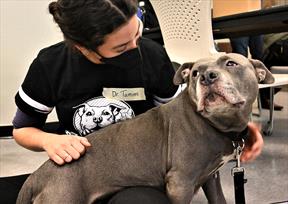
Breaking Ground photo
Dr. Biana Tamimi checks in on Skylar during the first One Health clinic in New York in January 2023. A shelter medicine resident, Tamimi volunteers for quarterly pop-up clinics at housing facilities operated by social services nonprofit Breaking Ground.
"That really helped open my eyes to recognizing that there is such a strong connection there and a bond that impacts both the people and the animals," Tamimi said. She and a friend started their own street clinic in Edinburgh after graduating.
Those lessons have been reinforced by her shelter medicine residency. "I'm realizing so much that the only way we can help animals is by helping people," she said.
The structure of the New York clinic is different than in Seattle, where any young adult with a pet can participate on a drop-in basis. The New York clinics have mostly taken place at Breaking Ground's 100-unit transitional housing facility in the Union Square neighborhood and serve people who have established relationships with Breaking Ground or Janian.
Often, the 30-minute appointments begin with a few people joining the pet owner and the animal at a table: a veterinarian, a veterinary technician, a human health care provider like a nurse practitioner or primary care doctor, a psychiatrist and/or a social worker. The last is a "navigator" for the client, who guides them from the intake to a veterinary appointment and then to other practitioners on the human side.
Navigators exist in all the One Health initiatives going on right now, although who fills that role varies from place to place.
Much of the initial meeting is focused on the pet. "Everyone is communicating about the animal and petting and feeding, giving treats. … That animal is the center of attention, and that's what pet owners want," Tamimi said. "We use that relationship that the person has with the animal to open up the door for them to get health care for themselves."
Tamimi and her technician will examine the pet, provide basic wellness care and vaccinations, and offer low-cost or no-cost referrals for needed follow-ups. In this setting, even small interventions have a big impact. For example, getting animals vaccinated for rabies can eliminate one obstacle faced by pet owners who want to keep their animals at shelters and transitional housing facilities that allow co-sheltering.
Janian physician Maddox described the experience from her side of the table. "While the vets are doing their thing, we're listening and maybe chiming in a little bit and picking up on, what is that conversation?" she said. "Are there maybe things that are coming up with the animal that might have a human health side to them?"
An owner describing a pet's anxiety, Maddox said, sometimes points to their own anxiety, something her team can follow up on.
Tamimi said the One Health approach is a balm for her.
"Some of the primary causes of burnout for a lot of [veterinary] practitioners are that you are exhausted from … managing people's emotions and experiences and traumas," she said. "We don't have to do that in the One Health model. We can open the door for the discussion, but then there's a health care provider right there, and that is their specialty. I feel so much lighter knowing that pet owners are being looked after by professionals like that."
The appreciation is a two-way street. Breaking Ground's Betts said the experience of working in the One Health clinics has reinforced what he's long admired about veterinarians. "I think that human service providers can learn a lot about how we treat humans from how vets treat animals," he said, citing their "care and compassion, not letting the perfect be the enemy of the good … managing expectations and being gentle."
Monthly pop-ups around Tucson
Tucson_clinic
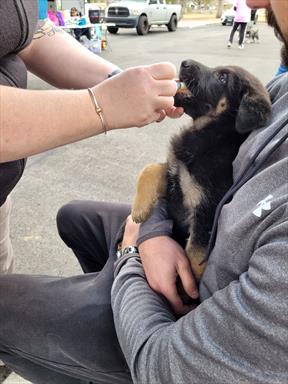
Photo by Cedar Mitchell
A puppy gets a dose of dewormer during a January One Health clinic in the parking lot of a public park in Tucson, Arizona.
Like happened in New York, a One Health clinic took root in Tucson in the wake of a talk by a member of the Seattle team — this time, Dr. Peter Rabinowitz, a physician and professor who directs the One Health research center at UW.
"He highlighted the health clinic … and I was blown away by the idea," said Cedar Mitchell, who attended a 2022 lecture by Rabinowitz at the University of Arizona. Mitchell is an epidemiologist working in the Pima County Health Department as part of a two-year postdoctoral fellowship with the U.S. Centers for Disease Control and Prevention's Epidemic Intelligence Service.
"I knew that Tucson was a very dog-friendly city and also had some large communities of people experiencing homelessness who also had pets," she recalled. "I was like, ‘I think this could be a really good fit for Tucson.' So I brought it to my supervisor, and she connected me with Danielle. The rest is history."
Danielle is Danielle Noumeh, clinical operations manager for Pima County Health clinics and mobile units. "I thought it was a great idea. I said, ‘Let's roll with it,' " she recalled.
Their enthusiasm was infectious. Pima County soon had veterinary partners. A veterinary professor and a veterinary technician from the University of Arizona College of Veterinary Medicine agreed to provide veterinary services. The county animal shelter provides pet food, name tags, collars, vaccines and other medical supplies for pets.
"We relied pretty heavily on the toolkit that the University of Washington put forward but then adapted it to fit our situation," Mitchell said.
The drop-in clinics happen roughly every month as pop-ups around the metro area — usually with folding tables under canopy tents in public parks. They run on a first-come, first-served basis for about four hours.
Pima County Health leads the Tucson clinics, and its nurses and nurse practitioners provide mobile services for humans that, depending on resources on any given day, include vaccination, blood pressure testing, screening for HIV and sexually transmitted diseases and housing and job counseling. Volunteers sometimes hand out Narcan, the nasal spray that can reverse an opioid overdose.
The first stop is almost always the veterinary station.
"The whole idea behind it is to make a softer entry into human health services," said Dr. Nellie Goetz, an associate professor of practice at the veterinary school. "That's how the model was set up; they're coming to get services for their pets, and 'Oh, hey, look, I can also do other things for myself while I'm here.' "
Cedar_Mitchell_Tucson
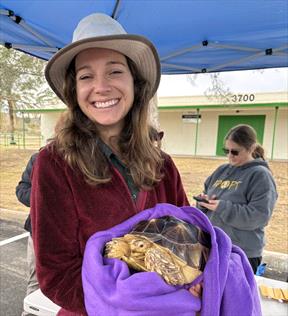
Photo by Jen Wagner
A tortoise drew a smile from Cedar Mitchell at a January One Health clinic in Tucson. An epidemiologist doing a two-year postdoctoral fellowship in the Pima County Health Department, Mitchell first suggested bringing a version of Seattle's integrated care clinic to Tucson.
Right now, the veterinary services at the Tucson clinics are limited. They include exams, vaccinations, deworming and microchipping. In some cases, such as for skin diseases, Goetz will call in prescriptions. She doesn't neuter pets or treat medical conditions, nor does she have medicines on site. She provides referrals to low-cost or free services when she can.
Even limited interventions serve larger public health goals, Mitchell said. She points to the fact that the health department gets lots of calls about rabies related to dog bites. "Being a part of this intervention, where we can see more rabies shots going into dogs and knowing that we're reducing that risk of rabies exposures for people in our community, is just a very real way to see how One Health feeds back into that public health cycle," she said.
Goetz highlighted how integrated care expands the view of the pet and the owner to take in the living environment they share, to improve outcomes for both.
She recalled the case of a woman who suspected her dog's hair loss and coughing were caused by an allergy to something in the apartment. During the veterinary appointment, Goetz noted that the woman also had a cough and suggested she talk to the human health providers. They documented lung sounds and skin lesions in a report the woman could take to her landlord to make the case for addressing what was making her sick.
Because the One Health Clinic in Seattle is driven by human and animal health programs at two universities, graduate students from across the health care disciplines are folded into the model. Goetz hopes the Tucson clinic might someday include veterinary students.
"Being able to critically think your way through a situation where you don't have a lot of resources, the pet parent doesn't have a lot of resources, and you need to have an open conversation with an open mind and zero judgments is one of the hardest things you'll ever do," Goetz tells her students.
Also of benefit: Developing a clinical rotation for veterinary students that includes the One Health clinic would likely mean directing some veterinary school resources to it, which could allow Goetz and others to expand the services they provide.
Community health fairs in Colorado
COHMO_3
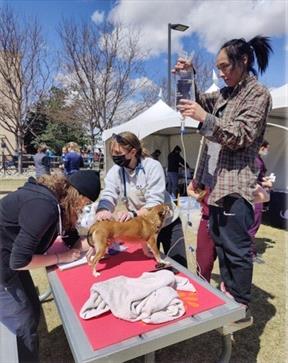
Street Dog Coalition photo
Community health fairs helmed by the Street Dog Coalition in Colorado combine the nonprofit's extensive experience with veterinary street medicine with an array of human health and social services for the working poor and families in need, at events around the state.
Street Dog Coalition plays a big role in the One Health care movement: Even as its volunteer veterinarians work in the New York and Seattle One Health clinics, the Colorado chapter has established its own twist on the model.
Known as community health fairs, the outdoor events began in 2021. They bring together a panoply of veterinary and human health care providers and social services aimed at assisting the working poor and families in need. Street Dog spearheads these events and underwrites all of the veterinary care.
Dr. Jon Geller, who founded the Street Dog Coalition in 2015, said he thinks calling it a community health fair makes the event approachable. "It means it's actually a fun event," he said.
As with the other models, participants are paired with a navigator during the veterinary appointment to connect them with a range of human health care services, some offered in walled tents that allow for privacy. There are also dental exams and cleanings and social services support. Sometimes, there are haircuts and bike repair. Always, there's a meal and a coffee. Everything is free.
Students from various disciplines volunteer, and there's lots of cross-pollination among teams, especially since zoonotic disease is often part of the picture. However, unlike the model begun in Seattle, there is less defined coordination across the human and veterinary teams. It happens in Colorado, but it's not fundamental to the approach.
Geller's work on Street Dog and community health fairs has fueled in him a growing sense of responsibility for addressing problems for "people who have fallen through the cracks." At 73, he is on track to complete a Master's of Public Health in May.
"Most of the pet stuff is straightforward," Geller said. "It's the people side that has amazing challenges. That's what we're trying to do with our One Health outreach: Provide care for both ends of the leash. "